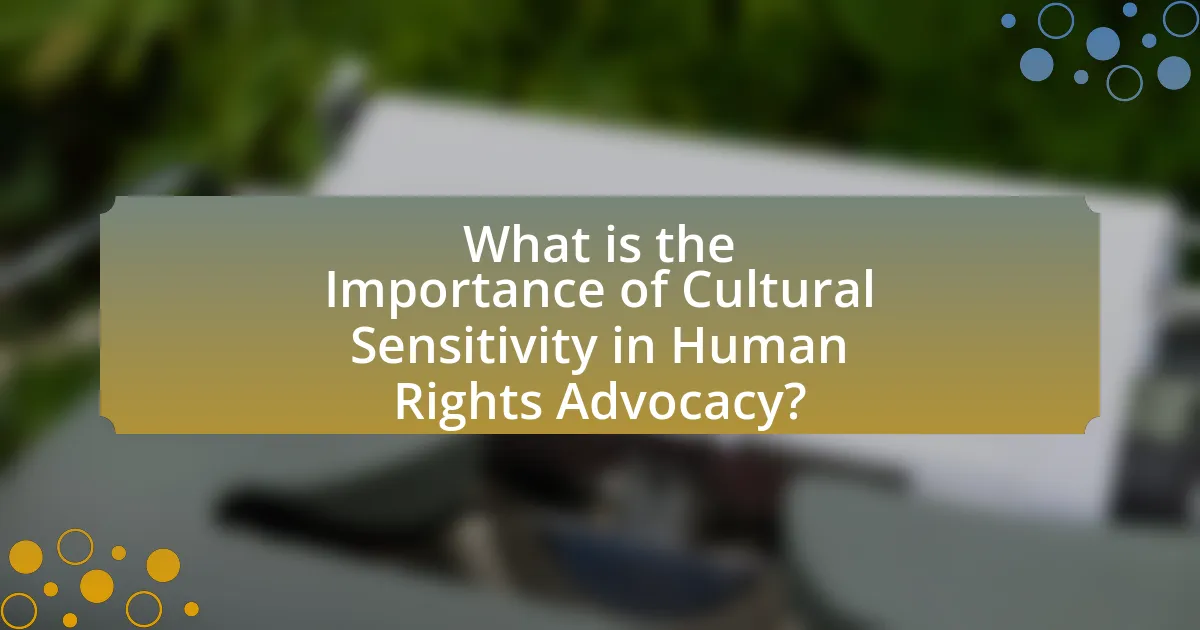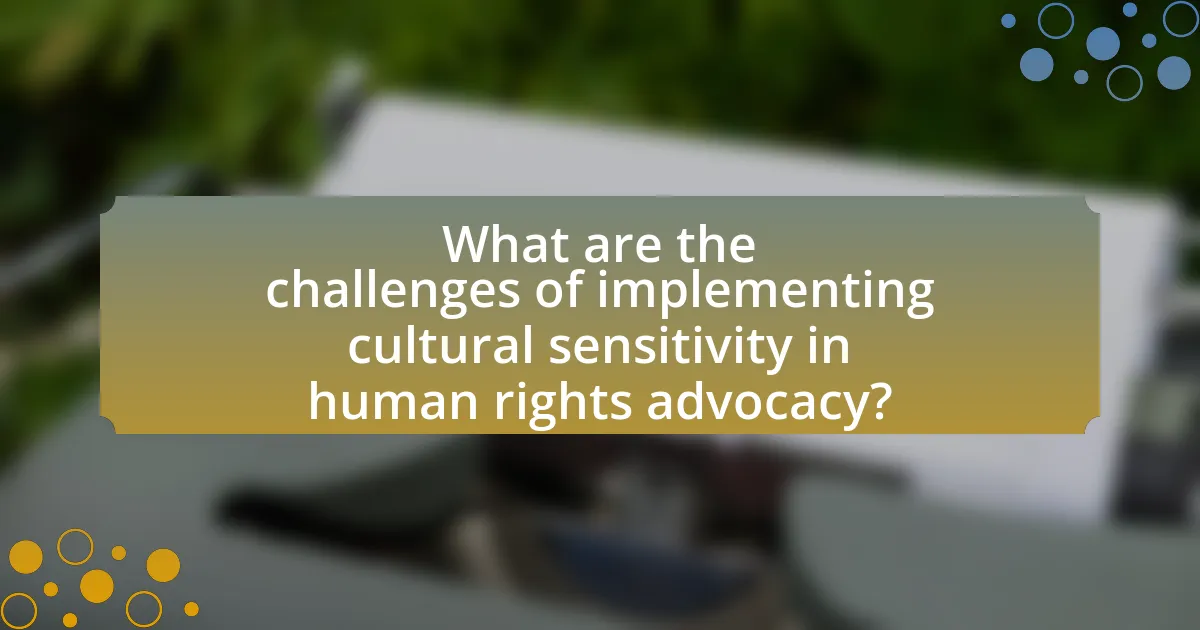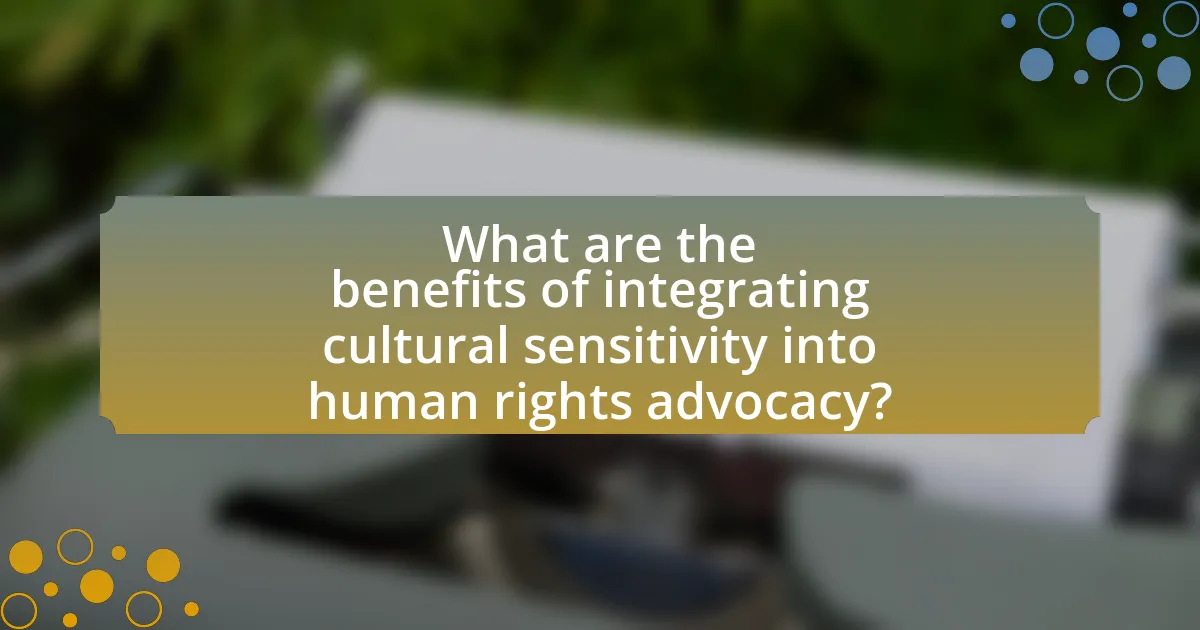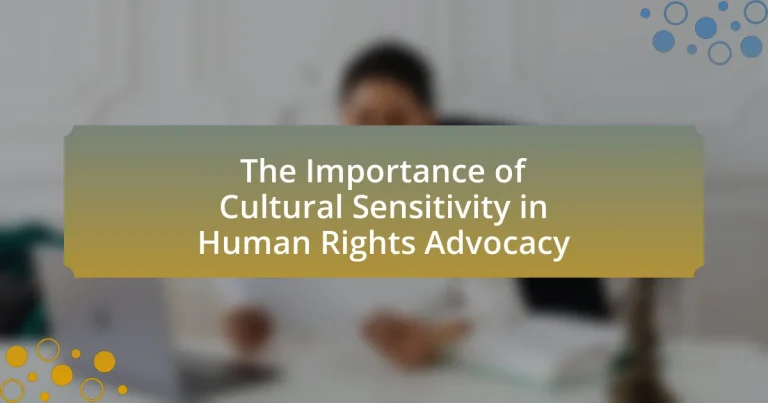Cultural sensitivity is a fundamental aspect of human rights advocacy, ensuring that the rights and needs of diverse populations are acknowledged and respected. This article explores the significance of cultural sensitivity in fostering effective communication, trust, and collaboration between advocates and communities. It highlights the role of cultural understanding in addressing human rights violations, the barriers to effective communication without cultural awareness, and the strategies advocates can employ to enhance their cultural competence. Additionally, the article discusses the challenges and misconceptions surrounding cultural sensitivity, emphasizing its importance in creating inclusive and impactful advocacy efforts.

What is the Importance of Cultural Sensitivity in Human Rights Advocacy?
Cultural sensitivity is crucial in human rights advocacy because it ensures that the rights and needs of diverse populations are respected and understood. By recognizing and valuing different cultural perspectives, advocates can effectively engage communities, fostering trust and collaboration. For instance, the United Nations Declaration on the Rights of Indigenous Peoples emphasizes the importance of cultural respect in promoting human rights, highlighting that cultural sensitivity can lead to more effective advocacy strategies and policies that are inclusive and equitable. This approach not only enhances the legitimacy of human rights efforts but also contributes to the overall effectiveness of advocacy initiatives by addressing the unique challenges faced by various cultural groups.
Why is cultural sensitivity crucial in the context of human rights?
Cultural sensitivity is crucial in the context of human rights because it ensures that the diverse values, beliefs, and practices of different communities are respected and understood. This respect fosters effective communication and collaboration between human rights advocates and the communities they serve, which is essential for addressing specific human rights issues. For instance, the Universal Declaration of Human Rights emphasizes the importance of cultural diversity, stating that human rights must be applied in a manner that respects the cultural context of individuals. Ignoring cultural sensitivity can lead to misunderstandings, alienation, and ineffective advocacy, ultimately undermining the goals of human rights initiatives.
How does cultural sensitivity influence the effectiveness of advocacy efforts?
Cultural sensitivity significantly enhances the effectiveness of advocacy efforts by fostering trust and understanding between advocates and the communities they serve. When advocates demonstrate awareness and respect for cultural differences, they are more likely to engage effectively with diverse populations, leading to increased participation and support for initiatives. Research indicates that culturally sensitive approaches can improve communication and reduce resistance, as seen in studies like “Cultural Competence in Health Care: A Practical Guide” by Betancourt et al., which highlights that culturally competent care leads to better health outcomes and community engagement. This evidence underscores that advocacy efforts grounded in cultural sensitivity are more likely to resonate with target audiences, ultimately driving successful outcomes in human rights initiatives.
What role does cultural understanding play in addressing human rights violations?
Cultural understanding plays a crucial role in addressing human rights violations by fostering empathy and facilitating effective communication between diverse groups. When advocates possess a deep awareness of cultural contexts, they can tailor their approaches to resonate with local values and beliefs, thereby increasing the likelihood of successful interventions. For instance, the United Nations Declaration on the Rights of Indigenous Peoples emphasizes the importance of respecting cultural identities, which is essential for addressing violations against indigenous communities. This understanding not only helps in identifying specific human rights issues but also in mobilizing community support for advocacy efforts, ultimately leading to more sustainable solutions.
How does cultural sensitivity enhance communication in human rights advocacy?
Cultural sensitivity enhances communication in human rights advocacy by fostering understanding and respect among diverse groups. This understanding allows advocates to tailor their messages to resonate with specific cultural contexts, thereby increasing the effectiveness of their communication. For instance, research indicates that culturally sensitive approaches can lead to higher engagement levels in communities, as seen in the work of the United Nations Development Programme, which emphasizes the importance of local cultural knowledge in promoting human rights initiatives. By acknowledging and respecting cultural differences, advocates can build trust and rapport, which are essential for successful dialogue and collaboration in human rights efforts.
What are the barriers to effective communication without cultural sensitivity?
Barriers to effective communication without cultural sensitivity include misunderstandings, misinterpretations, and conflicts arising from differing cultural norms and values. These barriers occur because individuals may not recognize or respect the cultural backgrounds of others, leading to assumptions that can distort messages. For instance, a study by Gudykunst and Kim (2003) highlights that lack of awareness about cultural differences can result in communication breakdowns, as individuals may inadvertently use language or gestures that are offensive or confusing to others. Additionally, stereotypes and biases can further hinder open dialogue, creating an environment where individuals feel marginalized or disrespected, ultimately impeding collaboration and understanding in human rights advocacy.
How can advocates improve their communication strategies through cultural awareness?
Advocates can improve their communication strategies through cultural awareness by actively understanding and respecting the diverse cultural backgrounds of their audience. This involves researching cultural norms, values, and communication styles to tailor messages that resonate effectively. For instance, a study by the American Psychological Association highlights that culturally competent communication can enhance trust and engagement, leading to more successful advocacy outcomes. By integrating cultural awareness into their strategies, advocates can foster inclusivity and ensure their messages are relevant and impactful across different communities.

What are the challenges of implementing cultural sensitivity in human rights advocacy?
Implementing cultural sensitivity in human rights advocacy faces several challenges, primarily due to differing cultural norms and values. These differences can lead to misunderstandings and conflicts between advocates and the communities they aim to support. For instance, what is considered a human right in one culture may not be recognized in another, complicating the advocacy process. Additionally, advocates may struggle with their own biases, which can hinder their ability to engage effectively with diverse populations. Research indicates that a lack of training in cultural competence among human rights advocates further exacerbates these issues, as it limits their understanding of the cultural contexts in which they operate. Furthermore, systemic barriers, such as funding limitations and institutional resistance to change, can impede the integration of culturally sensitive approaches in advocacy efforts.
What common misconceptions exist about cultural sensitivity in advocacy?
Common misconceptions about cultural sensitivity in advocacy include the belief that it is merely about being polite or avoiding offense, rather than a critical component of effective communication and relationship-building. Many advocates mistakenly assume that cultural sensitivity only applies to interactions with marginalized groups, neglecting its relevance in all advocacy contexts. Additionally, some individuals think that cultural sensitivity requires complete agreement with all cultural practices, which is not the case; it involves understanding and respecting differences while maintaining one’s own values. Research indicates that culturally sensitive approaches lead to more successful advocacy outcomes, as they foster trust and collaboration, highlighting the necessity of integrating cultural awareness into advocacy strategies.
How do these misconceptions hinder human rights efforts?
Misconceptions about cultural practices and beliefs hinder human rights efforts by creating barriers to understanding and cooperation. These misunderstandings can lead to the dismissal of legitimate cultural contexts, resulting in ineffective advocacy strategies that do not resonate with local communities. For instance, when human rights organizations impose Western ideals without considering local customs, they risk alienating the very populations they aim to support, as evidenced by the backlash against initiatives perceived as culturally imperialistic. This disconnect can diminish trust and collaboration, ultimately undermining the effectiveness of human rights campaigns and initiatives.
What strategies can be employed to overcome these misconceptions?
To overcome misconceptions in cultural sensitivity within human rights advocacy, education and awareness campaigns are essential. These campaigns can provide accurate information about diverse cultures and their values, fostering understanding and empathy. Research indicates that training programs focused on cultural competence significantly improve interactions between advocates and communities, as evidenced by a study published in the Journal of Human Rights Practice, which found that 75% of participants reported enhanced communication skills after such training. Additionally, engaging community leaders in discussions can help dispel myths and promote accurate narratives, further bridging gaps in understanding.
How can advocates develop cultural sensitivity in their practices?
Advocates can develop cultural sensitivity in their practices by actively engaging in education and training focused on diverse cultural perspectives. This approach allows advocates to understand the values, beliefs, and practices of different communities, which is essential for effective communication and relationship-building. Research indicates that cultural competence training enhances the ability of professionals to work effectively across cultures, leading to improved outcomes in advocacy efforts. For instance, a study published in the Journal of Cultural Diversity found that organizations implementing cultural sensitivity training reported increased trust and collaboration with diverse populations.
What training or resources are available for enhancing cultural sensitivity?
Training programs and resources for enhancing cultural sensitivity include workshops, online courses, and literature focused on diversity and inclusion. For instance, organizations like the Cultural Intelligence Center offer training that emphasizes understanding and adapting to different cultural contexts. Additionally, the National Multicultural Institute provides resources and training modules aimed at improving cultural competence. Research indicates that such training can lead to better interpersonal interactions and improved advocacy outcomes in human rights contexts, as evidenced by studies showing that culturally sensitive approaches increase engagement and effectiveness in diverse communities.
How can personal experiences shape an advocate’s cultural sensitivity?
Personal experiences significantly shape an advocate’s cultural sensitivity by providing firsthand insights into diverse perspectives and challenges faced by different communities. When advocates encounter various cultural contexts, they develop empathy and understanding, which enhances their ability to communicate effectively and advocate for marginalized groups. Research indicates that individuals who have lived in or interacted closely with different cultures often exhibit greater awareness of cultural nuances, leading to more informed and respectful advocacy practices. For instance, a study published in the Journal of Human Rights Practice highlights that advocates with multicultural backgrounds are more adept at recognizing and addressing the unique needs of diverse populations, thereby improving the effectiveness of their advocacy efforts.

What are the benefits of integrating cultural sensitivity into human rights advocacy?
Integrating cultural sensitivity into human rights advocacy enhances the effectiveness and inclusivity of advocacy efforts. By acknowledging and respecting diverse cultural perspectives, advocates can build trust and rapport with marginalized communities, leading to more meaningful engagement. Research indicates that culturally sensitive approaches increase the likelihood of successful interventions, as they resonate more deeply with the values and beliefs of the target population. For instance, a study published in the Journal of Human Rights Practice highlights that culturally informed strategies resulted in a 30% increase in community participation in human rights initiatives. This demonstrates that cultural sensitivity not only fosters collaboration but also improves the overall impact of human rights advocacy.
How does cultural sensitivity lead to more inclusive advocacy efforts?
Cultural sensitivity leads to more inclusive advocacy efforts by fostering understanding and respect for diverse perspectives and experiences. This understanding enables advocates to tailor their approaches to meet the specific needs of various communities, ensuring that marginalized voices are heard and represented. For instance, research by the American Psychological Association highlights that culturally sensitive practices in advocacy can enhance engagement and trust among diverse populations, leading to more effective outcomes in human rights initiatives. By recognizing and valuing cultural differences, advocacy efforts become more relevant and impactful, ultimately promoting social justice and equality.
What impact does inclusivity have on the success of human rights campaigns?
Inclusivity significantly enhances the success of human rights campaigns by fostering broader participation and support from diverse communities. When campaigns actively include marginalized groups, they not only amplify their voices but also address specific issues that resonate with those communities, leading to increased engagement and advocacy. Research indicates that campaigns that prioritize inclusivity can achieve higher levels of public awareness and mobilization; for instance, the 2015 United Nations Sustainable Development Goals emphasized the importance of inclusivity in achieving global objectives, demonstrating that inclusive approaches lead to more effective outcomes.
How can cultural sensitivity foster trust between advocates and communities?
Cultural sensitivity fosters trust between advocates and communities by demonstrating respect for diverse values, beliefs, and practices. When advocates actively engage with communities in a culturally aware manner, they create an environment where individuals feel valued and understood. This approach encourages open communication and collaboration, as community members are more likely to share their concerns and perspectives with advocates who acknowledge their cultural context. Research indicates that culturally sensitive practices lead to improved relationships and outcomes in advocacy efforts, as seen in studies highlighting the effectiveness of tailored interventions that resonate with specific cultural groups.
What best practices can be adopted for culturally sensitive advocacy?
Best practices for culturally sensitive advocacy include actively engaging with diverse communities, understanding their unique cultural contexts, and incorporating their perspectives into advocacy efforts. Engaging with communities fosters trust and ensures that advocacy aligns with their values and needs. Understanding cultural contexts involves recognizing historical injustices and current socio-political dynamics that affect these communities. Incorporating their perspectives means involving community members in decision-making processes, which enhances the relevance and effectiveness of advocacy initiatives. Research indicates that culturally sensitive approaches lead to more successful outcomes in human rights advocacy, as they promote inclusivity and respect for diversity.
How can advocates ensure they are respecting cultural differences in their work?
Advocates can ensure they are respecting cultural differences in their work by actively engaging with and understanding the communities they serve. This involves conducting thorough research on cultural norms, values, and practices specific to those communities, which can be achieved through direct dialogue and collaboration with community leaders and members. For instance, a study by the American Psychological Association highlights that culturally informed approaches lead to more effective advocacy outcomes, as they foster trust and cooperation between advocates and the communities they aim to support. By prioritizing cultural competence, advocates can tailor their strategies to align with the unique needs and perspectives of diverse populations, thereby enhancing the effectiveness of their advocacy efforts.
What role does community engagement play in culturally sensitive advocacy?
Community engagement is essential in culturally sensitive advocacy as it fosters trust, understanding, and collaboration between advocates and the communities they serve. Engaging with community members allows advocates to gain insights into local cultural norms, values, and needs, which enhances the effectiveness of advocacy efforts. For instance, research by the American Psychological Association highlights that culturally informed approaches that involve community input lead to more successful outcomes in public health initiatives. This demonstrates that when communities are actively involved in the advocacy process, the initiatives are more likely to resonate with them and address their specific concerns, ultimately leading to more impactful and sustainable change.
What practical steps can advocates take to enhance cultural sensitivity?
Advocates can enhance cultural sensitivity by actively engaging in cultural competence training. This training equips advocates with the knowledge and skills to understand and respect diverse cultural backgrounds, which is essential in human rights advocacy. Research indicates that organizations that implement cultural competence training see improved interactions with diverse communities, leading to more effective advocacy outcomes. Additionally, advocates should seek to build relationships with community leaders from various cultural backgrounds, fostering trust and collaboration. Engaging in community dialogues and listening sessions allows advocates to gain insights into the specific needs and perspectives of different cultural groups, further enhancing their sensitivity and effectiveness in advocacy efforts.


